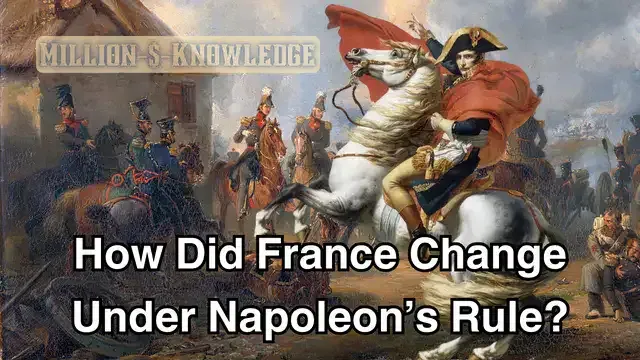How Did France Change Under Napoleon’s Rule?
Under Napoleon's rule, France underwent significant changes in various aspects of its society.
This article will explore the political, economic, social, cultural, and military changes that occurred during his tenure.
Additionally, it will examine the resistance and opposition faced by Napoleon and conclude with an overview of the overall impact of his rule on France.
 |
| How did France change under Napoleon’s rule? |
📔Table of Contents:
- Introduction
- Political Changes
- Economic Changes
- Social Changes
- Cultural Changes
- Military Changes
- Resistance and Opposition
- Conclusion
Political Changes
Napoleon centralized political power, establishing a strong and centralized government known as the Consulate and later the Napoleonic Empire.
He created a constitution, known as the Napoleonic Code, which emphasized equality, meritocracy, and civil liberties. This system replaced the old feudal system and brought stability to France, with Napoleon serving first as consul and later as emperor.
Economic Changes
Napoleon implemented several economic reforms aimed at promoting industrialization and improving the economy. He introduced a centralized banking system, controlled prices, imposed protective tariffs, and created the French franc as the national currency. These measures encouraged trade and commerce, leading to economic growth and development.
Social Changes
Napoleon's rule brought significant social changes in France. The Napoleonic Code abolished feudal privileges and introduced equality before the law, ensuring civil liberties such as freedom of religion and property rights. Educational reforms were also implemented, establishing a comprehensive system of public education.
Cultural Changes
Napoleon established the Institut de France, which promoted literature, science, and the arts. Napoleon himself actively patronized artists, musicians, and writers, promoting the ideal of the Enlightenment while also embracing neoclassical aesthetics.
Military Changes
Napoleon greatly expanded the French military and transformed it into a formidable force. He introduced conscription, creating a large army of loyal soldiers.
His military campaigns, such as the Napoleonic Wars, brought victories and territorial expansion for France, but they also resulted in widespread devastation and loss of life.
Resistance and Opposition
Although Napoleon was popular, he faced opposition from various groups. Some French citizens protested his autocratic rule and restrictions on civil liberties. Countries like Britain and Russia also opposed his expansionist ambitions and formed an alliance against France. These alliances ultimately led to the downfall of Napoleon.
Conclusion
Napoleon's rule brought profound changes to France. His political reforms centralized power and promoted equality under law.
👉Economically, France experienced growth and development under his policies.
👉Socially, Napoleon introduced new rights and educational reforms.
👉Culturally, they influenced French art and science.
👉Militarily, France became a major power, albeit at the cost of significant human suffering.
Opposition and resistance to Napoleon's rule ultimately led to his downfall, but his influence on France and Europe cannot be underestimated.
READ MORE:
👉 How did Adolf Hitler rise to power?
👉 Complete History of Pallava Dynasty
👉 How to build a relationship with god?





